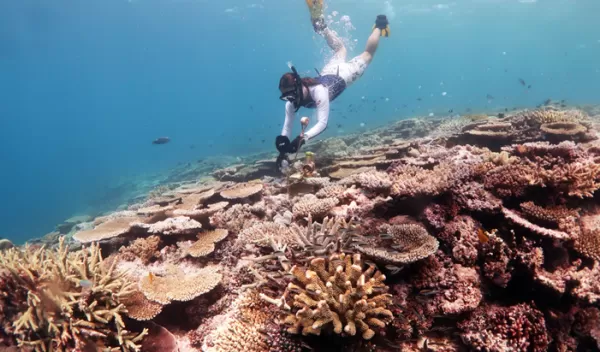
Environment influences coral's resilience to acidification
Corals are especially vulnerable to damage from ocean acidification, and rising CO2 levels jeopardize the future of coral reefs globally. However, a new study by researchers at the University of Pennsylvania and the University of Queensland report that certain corals may do better than others at withstanding ocean acidification.
The U.S. National Science Foundation-supported study was published in Proceedings of the Royal Society B. Using samples from the Great Barrier Reef, the researchers studied how coral from environments with greater CO2 variability respond to increasing acidification.
Ocean acidification threatens coral because it breaks down the rocky, calcified skeletons that give coral its distinctive structure, says Katie Barott of Penn, senior author of the study. When water CO2 levels surge, corals can no longer grow or maintain their skeletons.
While ocean acidification is a consequence of climate change, there are also regular fluctuations in water pH that occur regardless of greenhouse gas emission levels. These fluctuations are driven by respiration from the coral and photosynthesis from the coral's symbiotic algae.
In the ocean, coral from the reef flat normally grows long, wide branches, whereas coral from the reef slope normally grows dense, consolidated branches. But after eight weeks in lab treatment tanks, the researchers started to "see shifts in how they were calcifying," says Barott.
The scientists found that the surface area of the coral's skeletons — a metric of how long the branches grew — changed in response to their new environment. In the tanks that simulated the reef flat, parts of the coral skeleton began to grow longer, and in the tanks that simulated the reef slope, parts of the coral skeleton began to grow shorter.
However, many other features of the coral's growth and calcification stayed true to its original environment. These results suggest that, while coral can partially adapt to new changes in environmental acidity, its behavior is still constrained by its native environment.
The researchers believe that reef flat coral's exposure to natural pH variability primed it to endure more extreme acidification. "Those cells are dealing with big pH disturbances every day," says Barott. "So, they must have a toolkit for that."
Barott and her team are still figuring out what exactly that toolkit is. In the next phase of their research, they'll explore which specific proteins and genes underlie the reef flat coral's resilience against acidification.
